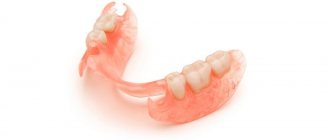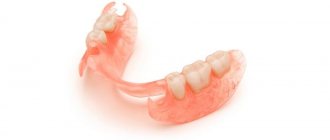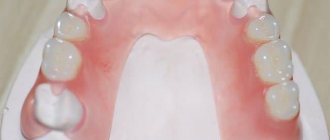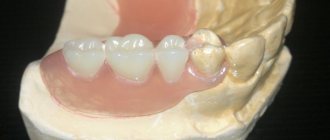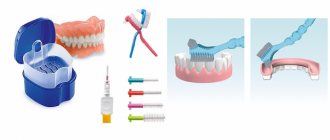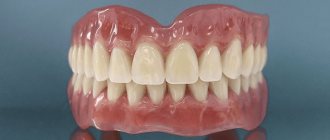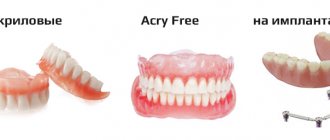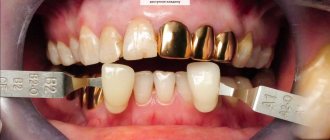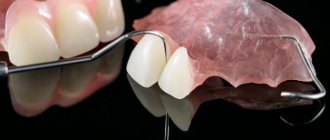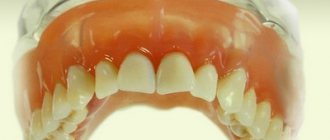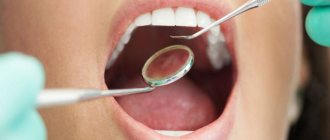Removable dentures are represented by structures that are fixed on the gums not with glue, but with the help of special clasps. Such dentures are made when the patient has lost one tooth unit or, most often, several. Most of the current designs are made from modern acrylic plastic. This material is durable and retains both color and shape for a long time.
Do I need to remove dentures at night?
Why it may be necessary to remove a prosthesis
If we discuss modern prostheses, then it is not at all necessary to take them off every night. Orthopedists recommend removing them if you feel a burning sensation on the mucous membranes or dryness in the oral cavity. It also happens that a rash appears on the body. But these cases are rare and allergic in nature. If it occurs, you need to go to the doctor to eliminate the causes of this pathological situation.
You don't have to take your dentures off every night
Another point why a patient may need to remove dentures at night is his own fears. A certain percentage of people are quite suspicious of their own health and the manipulations that doctors perform with it. Removable dentures are an innovation in their lifestyle, they need to get used to them, realize that they now replace missing teeth. A person may be afraid that the prosthesis will fall out of place in a dream, that it could be injured. Some prosthetic owners even worry that they will be able to swallow a small prosthesis (although this is very problematic).
The orthopedist will explain to the patient how to care for the prosthesis and how to store it.
Of course, a doctor can dispel such fears. If the patient trusts his orthopedist, and he, in turn, explained to the person everything about the use of prostheses, worries will disappear on their own. But if the person himself decides that it is safer for him to remove the prosthesis at night, then he may well do so.
How much will prosthetics cost?
Prosthetics usually take place in several appointments with a doctor. During the first visit, the patient will have a consultation with an orthopedist and a dental technician, diagnostics, history taking and impressions taken for the manufacture of an individual prosthesis. These services are not included in the cost of the prosthesis and are paid additionally. At the next appointment, the manufactured structure is tried on and adjusted, and recommendations for its care are received.
The price of a denture made of nylon is higher than its analogue made of plastic. Partial replacement of missing teeth in Moscow will cost about 15,000 - 20,000 rubles, complete replacement - about 50,000 rubles. Please note that clinics provide different warranty periods for finished structures. Choose the option that seems most suitable to you.
How to store dentures at night
Previous rubber prostheses, which were used before modern acrylic structures, had to be removed every night. And they left them overnight in a regular glass of water. Today, with prosthetics, things are a little different. Only at the initial stage of construction a humid environment is required, no more than one and a half months. Acrylic plastic takes on its best appearance when exposed to air, which is explained by the passage of monomers.
The logic is simple: the human mouth already has a humid environment, which means that dentures can be worn in the mouth, removing them only occasionally. And they need to be stored not in glasses, but in convenient containers. In some cases, dentures may be wrapped in cotton cloth.
Container for dentures
If you are going to take out your dentures before going to bed, you need to follow simple instructions.
- Acrylic dentures
How to properly remove dentures at night:
- the structures are removed and washed thoroughly with boiled water (but not running!);
- The prosthesis can be cleaned with a special liquid with an antiseptic effect, as well as with a brush;
- place the structure in a special solution: this composition destroys bacteria that have accumulated during the day, and also removes the remnants of the fixing cream.
Korega tablets for cleaning dentures
About once a year, dentures should be professionally cleaned at a dental clinic. Immediately after installing the structure, ask the doctor how to properly clean them, where to get the composition and storage container, and how often to come for preventive appointments. The doctor is obliged to provide you with comprehensive information.
Video: Should I take my dentures off at night?
Stages of orthopedic installation removal
The process of dismantling a fixed prosthesis consists of the following steps:
- preparation: an orthopedic dentist examines the patient’s entire oral cavity and the problem area in particular, assesses their condition and comes up with a work plan,
- removal: the doctor and the patient decide on the method and the crown is dismantled,
- diagnostics: the doctor evaluates the integrity of the removed installation, and also carefully examines the condition of the tooth root on which the detached structure was supported. The place for subsequent fixation of the prosthesis is treated with antiseptics (and if necessary, therapeutic measures are carried out, during which the patient is given a temporary plastic crown),
- fixation: if the prosthesis was not deformed during removal, it is ready for reinstallation. Otherwise, you will have to wait until it is restored or a new crown is made. True, you will have to carry out several fittings and be sure to take into account the shape of the treated tooth - it is important that it completely coincides with the internal cavity of the crown,
- recovery: to avoid possible complications, the patient receives from the doctor a list of instructions for easy rehabilitation. At first, it is important to follow a special gentle diet.
Consequences of insufficient denture care
Dental removable structures require constant care. If you neglect it, you can face a whole list of problems. Therefore, from the very first day of using dentures, you need to follow the rules of care.
Possible consequences of insufficient denture care:
- repulsive odor emanating from dentures;
- carious destruction of native teeth;
- ulcers and erosions on the mucous membrane;
- inflammatory process on the gums;
- change in taste sensations for the worse;
- aesthetic defects of removable structures.
Dentures require mandatory cleaning and care
You should definitely seek help from specialists so that they can return your dentures to their previous appearance with professional cleaning. This will extend the life of the dentures. As a rule, all modern clinics carry out such cleaning.
Cleaning the prosthesis
Indications and contraindications
Indications for installation are the loss of teeth (one, several or all), especially if the patient cannot have implants installed. But there are also contraindications:
- periodontal disease grades 3 and 4, in which the tissue around the tooth is completely destroyed,
- low crown height of abutment teeth,
- inflammatory process of the mucous membranes or gums,
- high gum mobility,
- significant bone tissue atrophy,
- Recession is the receding or overgrowth of the gums.
How to get used to dentures faster
The problem of leaving the denture overnight or removing it usually occurs among those who are not fully accustomed to such teeth. At the same time, the person himself must show some effort; addiction requires the involvement of the owner of the prosthesis in this adaptation period.
How to get used to removable dentures
| Adaptation measures | How often to do | Notes |
| Reading aloud | At least three to four times a day for at least five minutes. | At the same time, you need to read expressively and measuredly so that the articulatory apparatus gets used to the new teeth. |
| Wear the design constantly | The dentures do not need to be removed at all for at least 4-5 days. | This is a mandatory measure - the key to successful addiction. |
| Optimal chewing load | An ordinary apple will help: cut it into pieces, chew gradually. Eat one or two apples a day this way. | Listen to your feelings; if the discomfort is severe, you should go to the doctor. |
| Regular cleaning | You need to clean your denture twice a day, morning and evening. | After every meal, rinse your mouth. |
- Clasp dentures
Although not often, it happens that at first a new design can cause vomiting. There is no need to panic and remove the prosthesis: breathe deeply, drink plenty of fluids. Sucking mints will help relieve the urge.
How common is denture intolerance?
There is a small percentage of patients who still cannot get used to removable structures. If the person himself follows all the instructions for successful adaptation, but the discomfort does not go away, this indicates intolerance to the prostheses. Usually, in this case, the prosthesis gets in the way, is perceived as a hindrance in the mouth, rubs the gums, spoils pronunciation, and makes it impossible to eat without feeling uncomfortable.
Sometimes intolerance to dentures occurs
Oddly enough, the dentist is a bad helper in such a situation. In most such cases, we are talking about psychological intolerance. Some internal attitudes prevent a person from accepting a prosthesis. It is logical to assume that you need to see a psychologist. This practice exists, and it is quite successful.
How to reduce pain symptoms when wearing a prosthesis
At first, a person may feel some pain while chewing. This is explained by the unusual load; over time, such sensations should go away. The gums, a certain area of which was without teeth for some time, “forgot” this condition with a full row of teeth, so it can be uncomfortable. Some patients say that they feel as if the denture is pressing on their gums.
Some patients claim that the denture puts pressure on the gums
To remove these negative feelings, give up solid food for the first month - food should be as soft and comfortable as possible. Solid foods are allowed only as you get used to the dentures.
You will have to give up solid food for a while
It is necessary to monitor the condition of the mucous membrane: any damage, even the slightest, should be prevented. They are fraught with an inflammatory process that will interfere with the use of prostheses. Prolonged pain during the use of prostheses is explained by only two reasons: hypersensitivity of the patient’s mucous membrane or an incorrectly made prosthesis, the size of which did not suit the patient.
It is important to observe the mucous membrane, noting the appearance of discomfort, pain
To ease the condition of your gums in the first days of adaptation, you can do self-massage. Using fingers treated with an antiseptic, you need to stroke the gum itself in a circular motion. There is only one movement - from the healthy gum area to the inflamed side. When the stroking becomes as comfortable as possible, the pressure can be increased.
Gum massage
Adaptation to prostheses is the work of the patient, his own efforts. Follow all instructions, do not remove the prosthesis too often, remember that you can sleep in it without any precautions. Read about rinsing after tooth extraction for gum healing on our website.
Nylon or acrylic: which is better?
Nylon prostheses are called “flexible” due to their elasticity. They are more convenient, and also less noticeable, than their predecessor counterparts - removable structures made of acrylic. The products are more aesthetically pleasing, but have a higher cost. A small list of contraindications for prosthetics. They do not cause allergic reactions. These elastic designs are created with a soft nylon base that is almost invisible in the mouth. The products are very comfortable to wear.
Undeniable advantages
nylon products:
- hypoallergenic - can be used for allergies;
- ease of care of the medical system;
- durability - have a long service life;
- durable and elastic, easy to use - able to withstand significant mechanical loads;
- have reliable fastening;
- do not require grinding of adjacent teeth or other painful procedures during installation;
- gel agents are not required for their fixation;
- can be worn constantly;
- does not accumulate foreign odors;
- microbiological inertness - the development of various pathogenic bacteria on the surface of the prosthesis is not supported;
- are easy to polish, so they fit tightly to the gums;
- diction is not violated;
- can be used by people suffering from heart disease and diabetes;
- It is possible to select any crown material for the manufacture of the product - the technology is available to people with different incomes.
There are also disadvantages
: fragility and softness of the manufacturing material - does not always withstand the load created during chewing. Over time, the structure “sags,” which can lead to gum injury. When wearing such structures, you should definitely monitor your oral cavity and visit the dentist with the frequency recommended when purchasing dentures.
Acrylic dentures have become widespread and inevitably enjoy considerable popularity. They are noticeably inferior in aesthetic characteristics to conventional ceramics or options made from metal ceramics. The weight of the structure is light, it does not require special care, and most importantly, it is inexpensive.
In a significant number of cases, older people are given acrylic dentures, which have an optimal quality-to-price ratio. They can be placed with partial or even complete edentia. And they are also recommended in cases where the patient has a significant gap in a row of teeth.
Advantages of acrylic products:
- almost absolute absence of contraindications;
- the product is suitable for both temporary and permanent wear;
- pleasant and easy to use
- has many shades, and therefore the color of artificial teeth will not differ from real ones;
- fastening using hooks allows you to avoid grinding down adjacent teeth;
- suitable for people of different age groups;
- have a reasonable price.
There are also disadvantages: the difference between an acrylic prosthesis and a nylon one is that it emits acrylic methacrylate, which can be negatively tolerated by the body; In the process of wearing dentures, the teeth adjacent to them are subject to abrasion, and the development of caries can result from this. They are quite fragile, despite this they can be used for about 8 years. It will take some time to get used to them.
